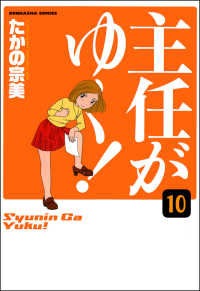- ホーム
- > 洋書
- > 英文書
- > Literary Criticism
Full Description
Working-Class Women in Irish Literature and Theatre critically engages with works of theatre both by and about working-class women, historically and presently. Addressing professional and community theatre productions, from both textual and performative perspectives, this volume focuses on works of theatre by practitioners, directors, playwrights, and performance artists across rural and urban contexts. Irish theatre has a long history of signifying social class. Yet the representations of working-class women in Irish theatrical history also encompass several problematic issues, starting with the fact that these depictions were created by male writers like J. M Synge and Seán O'Casey to name but a few. Nonetheless, the theatre's emphasis on embodied performance and its ability to reach its public in an unmediated way has attracted working-class engagement perhaps more than other art forms in Ireland. Contemporary playwrights in the Republic and the north of Ireland have tirelessly striven to illuminate working-class women's lived experiences and have reframed the characterisation of working-class women by drawing out the intersection of social class with sexualities, ethnic minorities, and racial identities. This edited collection also includes the voices of directors, playwrights, and performers who identify with a working-class social background, offering first-hand accounts of their lived experience in the theatre industry.
Contents
Introduction: No Working-Class Women in Irish Culture? by Clara Mallon and Salomé Paul
Section One: Absent Presence: Working-Class Women in the Canon
Chapter One: "Not in Flesh": The Construction and Deconstruction of "Poor Woman" in Irish Theatre by Salomé Paul
Chapter Two: Working-Class Actresses and Working-Class Roles: Ireland in the 1910s and 1950s by Cathy Leeney
Chapter Three: The Juno Complex: Tracing Representations of Working-Class Women in Contemporary Dublin Theatre by Fiona Charleton
Section Two: Class, Convergence and Consciousness on the Contemporary Stage
Chapter Four: Theatre of Grace Dyas: Classed Re-Imaginings of Social and Cultural Histories by Clara Mallon and Salomé Paul
Chapter Five: "Who are you angry with?": Class, Race, and Conflict in the Plays of Rosaleen McDonagh by Justine Nakase
Chapter Six: Hope in the Face of Despair: (Re)Presenting Working-Class Women in Natural History of Hope by Clara Mallon
Chapter Seven: The Bearable, Bridgeable and the Imaginable: Deirdre Kinahan's The Unmanageable Sisters by Eamonn Jordan
Chapter Eight: "Wakened" Solidarity: Making the Invisible Visible for Working-Class Women in Frank McGuinness's The Factory Girls by David Cregan
Section Three: Fractured Existences: Women on the Periphery in Theatre in the North of Ireland
Chapter Nine: Women's Work: Challenging Social Dysfunction through Working-Class Women's Performance Practice in the North of Ireland by Ciara L. Murphy
Chapter Ten: Confinement, Resistance and Reclaiming Space in JustUs's Just a Prisoner's Wife by Michael Pierse
Section Four: Breaking Silence: In Conversation with Working-Class Artists
Chapter Eleven: In Conversation with Veronica Dyas
Chapter Twelve: In Conversation with Louise Lowe
Chapter Thirteen: In Conversation with Felispeaks
Chapter Fourteen: In Conversation with Emmet Kirwan
-

- 電子書籍
- 私が女性用風俗を利用した結果。(分冊版…
-

- 電子書籍
- 王者の帰還~ヴァンパイアの世界に君臨せ…
-

- 電子書籍
- 俺の×××はいらないらしい【分冊版】 …
-

- 電子書籍
- AS+F(アズエフ)1992 Rd12…
-

- 電子書籍
- 主任がゆく!(分冊版) 【第10話】



